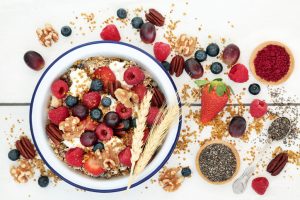Certain Types of Fiber Affect IBD Patients Differently

New research suggests a stool test could help doctors create customized nutrition plans for patients with Crohn’s disease and ulcerative colitis to reduce inflammation in the gastrointestinal tract.
Two Types of IBD: Crohn’s Disease and Ulcerative Colitis
Certain types of dietary fiber can cause inflammation in the intestines for people who suffer from Crohn’s disease or ulcerative colitis, collectively known as inflammatory bowel disease (IBD). About 3.1 million Americans have IBD, and many people are unaware that they have the condition.
Many people do not fully understand Crohn’s disease and ulcerative colitis. Crohn’s and Colitis Awareness Week is Dec. 1-7. Created in 2011, this initiative seeks to educate Americans and raise awareness of IBD in hopes to eventually eliminate these diseases.
The first step in awareness is knowing the warning signs of IBD. Chronic symptoms include abdominal pain, rectal bleeding, persistent diarrhea, fever and weight loss. In children and adolescents, IBD may lead to growth retardation and delayed puberty. IBD can also impact the bones, eyes, skin, kidneys, liver and joints.
Diet and Its Impact on Crohn’s and Colitis
According to new research in the journal Gastroenterology, people who have IBD may soon receive personalized nutrition suggestions. Most adults should consume 25 to 30 grams of dietary fiber per day, but fiber can affect people with IBD differently. Some types of dietary fiber can cause inflammation and exacerbate IBD symptoms.
The team performing the study is working to create a stool test that analyzes microbes in patients’ guts to predict who may respond negatively to certain types of fiber.
They discovered certain kinds of fibers found in specific foods are difficult to ferment if some microbes are malfunctioning or absent, as can be the case for Crohn’s and colitis patients. Some examples are artichokes, garlic, asparagus and bananas.
According to the study, between 20 and 40 percent of IBD patients have sensitivity to certain foods, but other patients benefit from dietary fibers. The research team developed a stool test to advise patients on how to make changes to their diets to prevent IBD flares. In some instances, patients can introduce foods back into their diets after avoiding them for a period of time.
“By creating this stool test, we are hoping to be able to tell you how to adjust your diet to prevent flares or further worsening,” said Eytan Wine, a professor in the University of Alberta’s Faculty of Medicine and Dentistry. “It’s a dynamic situation, so it’s possible that a certain food you should avoid now, in a few months you’ll be okay to eat that again.” (Medical Xpress).
Colon Cancer and IBD
Having Crohn’s disease or Ulcerative colitis can significantly increase your risk of developing colon cancer. Chronic inflammation of the colon can cause rapid turnover of cells in the lining of the large intestine, and this increases the chance of cancerous cells developing. Therefore, patients with IBD should communicate with their doctors about regular colon cancer screenings.
When was the last time you visited your gastroenterologist? Colonoscopy is the gold standard for colon cancer screening, so it is essential to stay current with your preventive exams. Call today to make an appointment.
